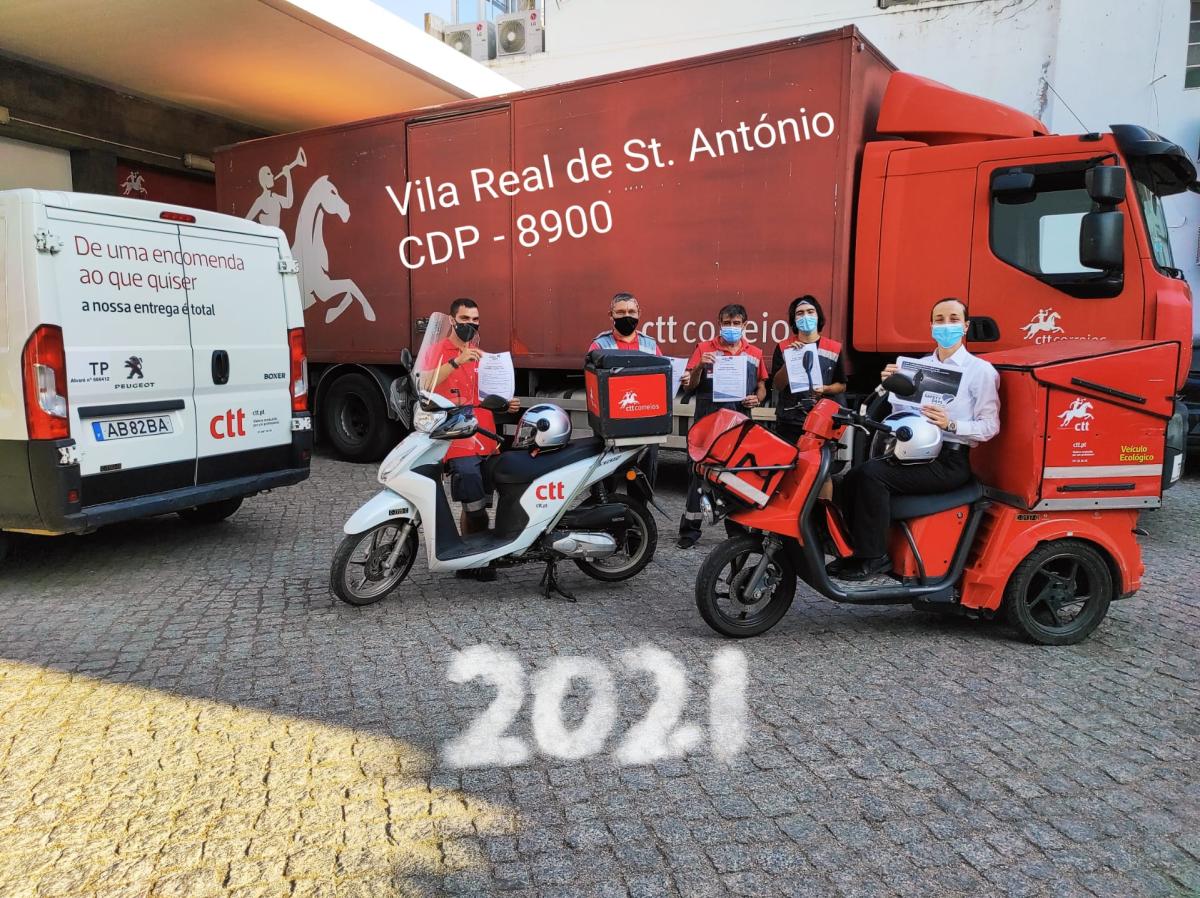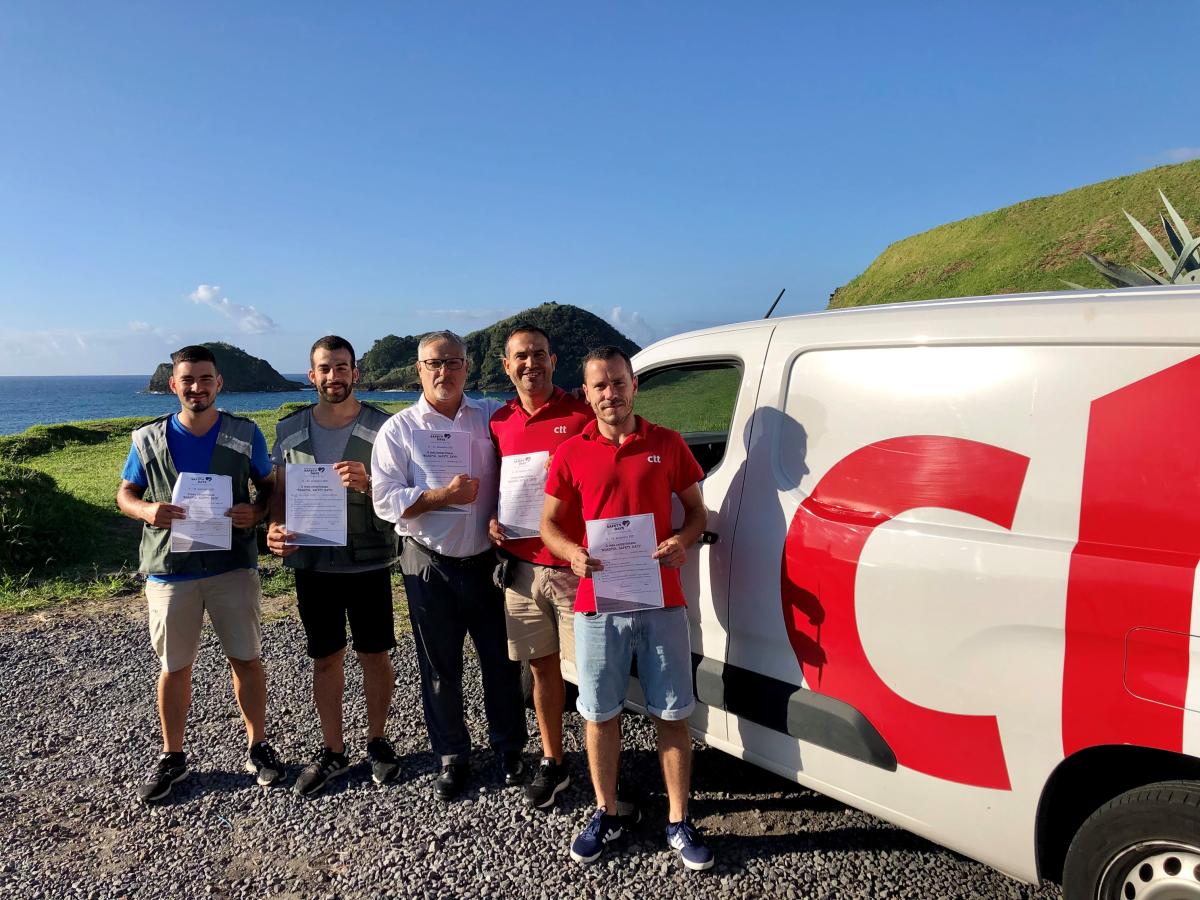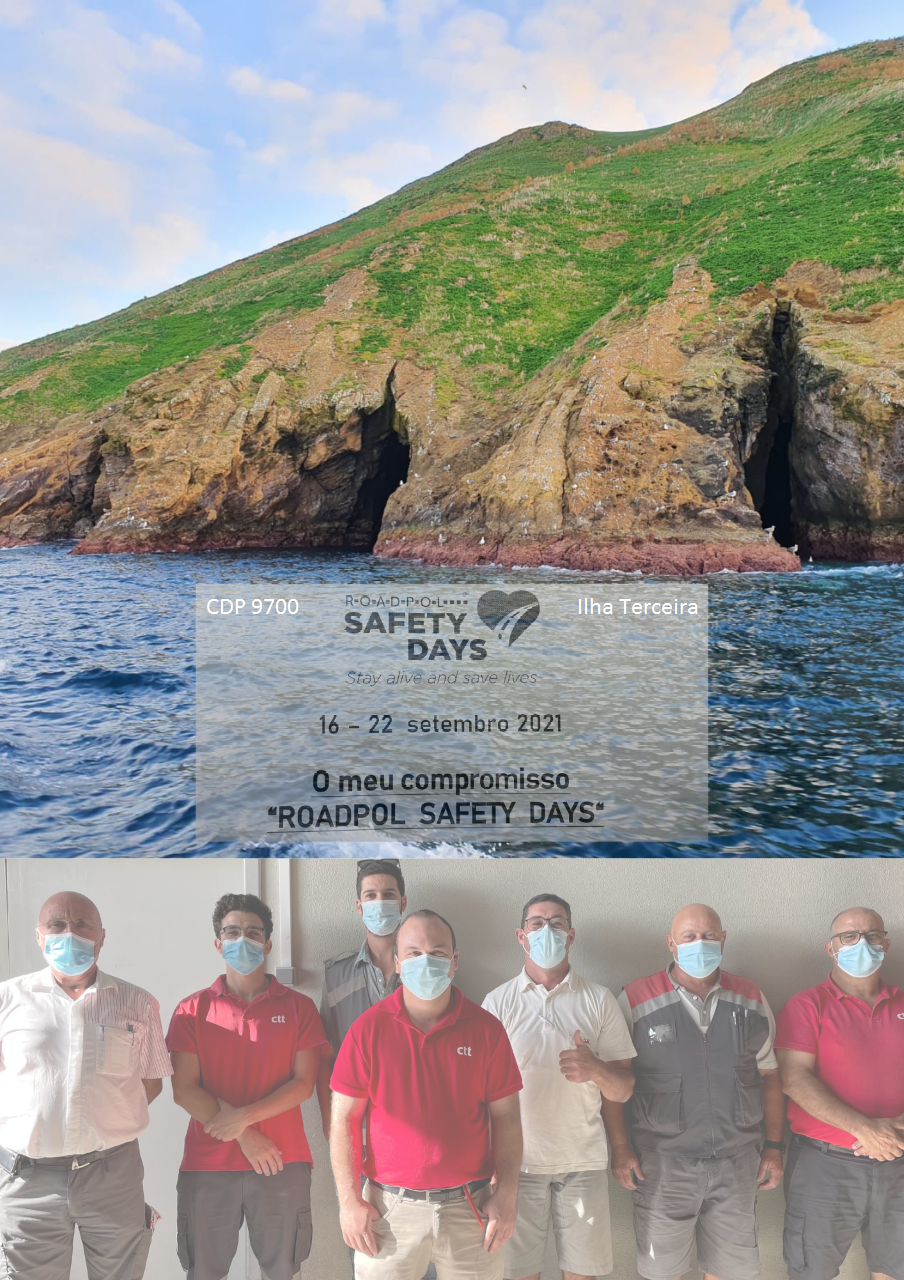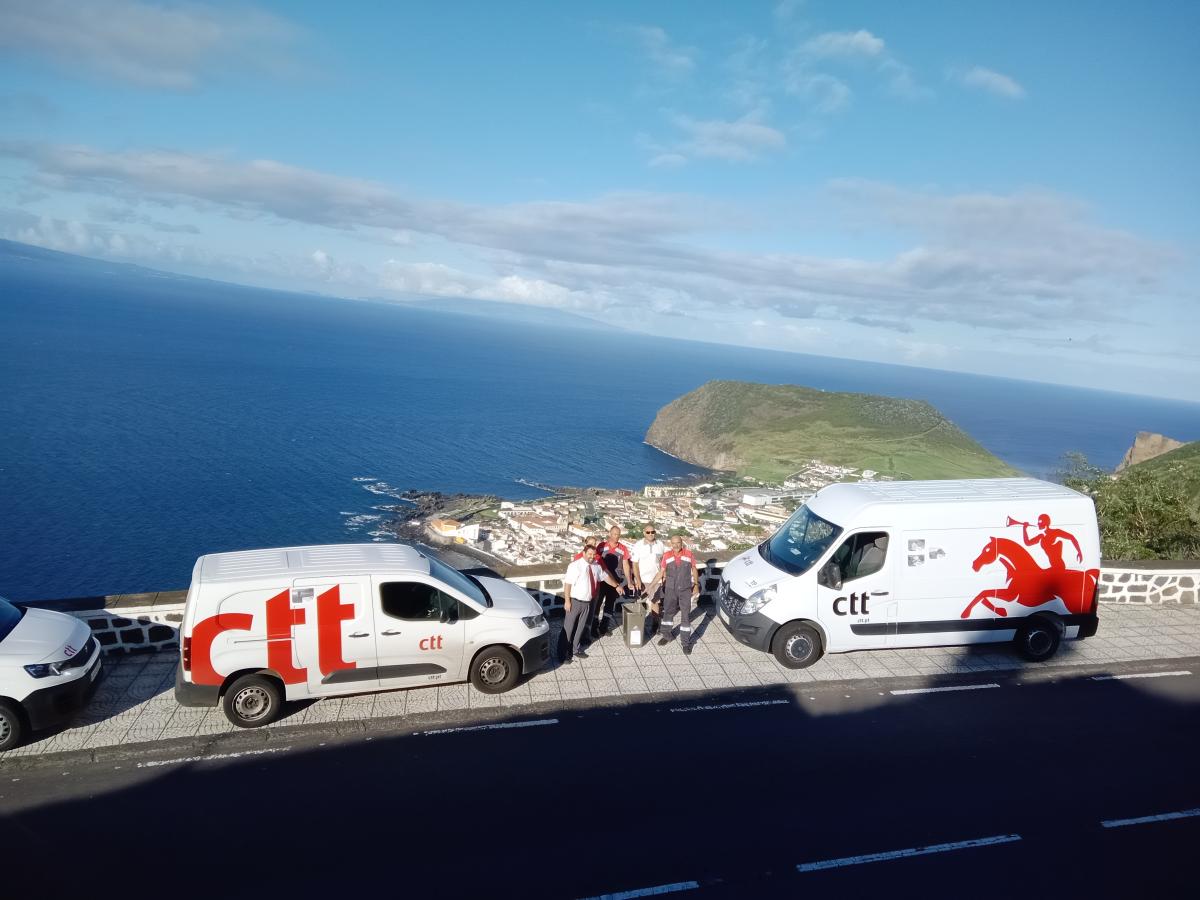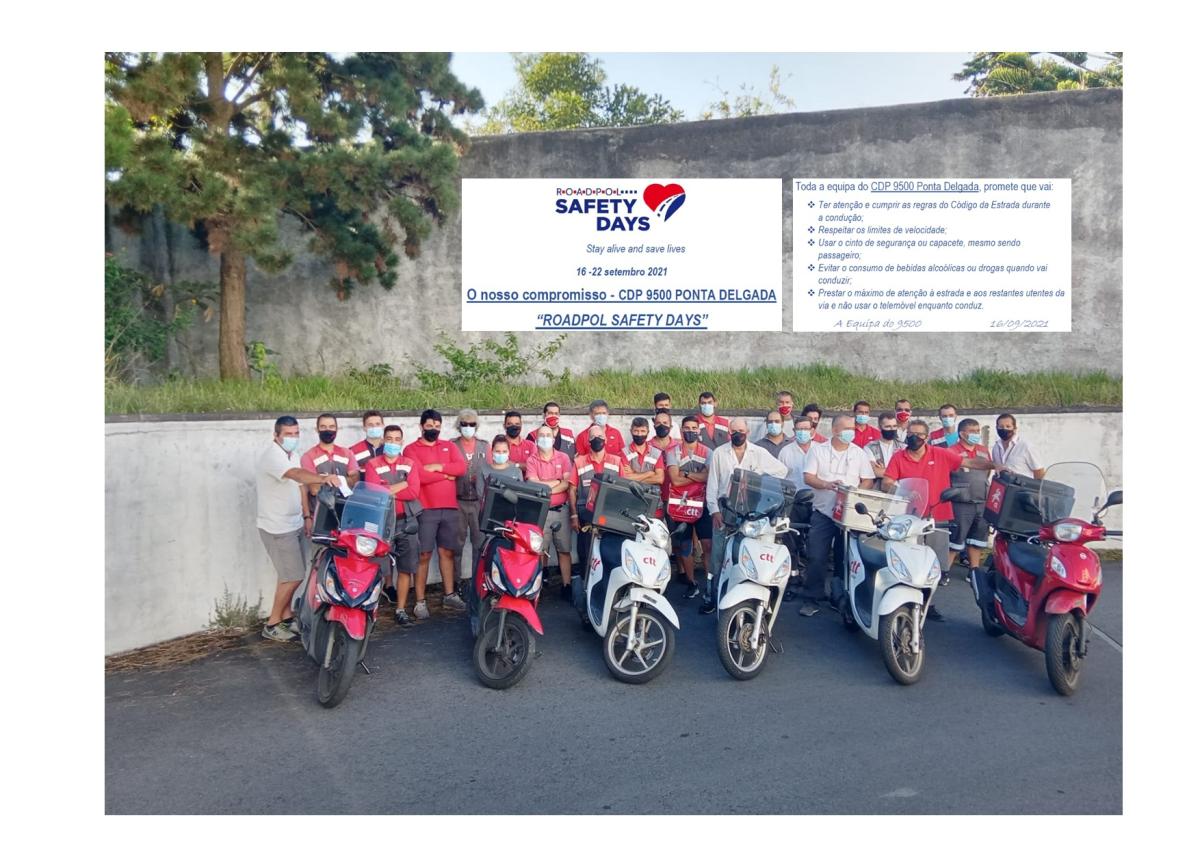Initiative details
CTT is the universal postal operator in Portugal. With a large fleet (4000 vehicles) and thousands of workers on the roads (12.000), with intense activity, there are many accidents, most of them only with material damage (about 1300 year), a significant part with personal injuries (447 in 2014 and 257 in 2021 ), injuries and some deaths, thousands of lost work days (17000 in 2014, 5316 in 2020 and 5913 in 2021) and consequences in terms of quality of service.
More information attached.
More information attached.
Initiative date
to
Who was/is your target audience?
Adults
Company employees
Fleet operators
Car drivers
Car drivers – professional
Van drivers
Lorry/truck drivers
Cyclists
Micromobility riders
Powered two wheeler riders (excluding micromobility)
Pedestrians
Topic
Knowledge building and sharing
Create awareness
Improve vehicles and infrastructure
Provide alternative solutions
Organisation details
CTT Correios de Portugal
Enterprise
Portugal
Lisbon
Contact name
José Fernando Guilherme
Telephone number
+351961704973
jose.guilherme@ctt.pt
Website
Project activities
If you work together with external partners, list the most important partners and briefly describe their role.
Practical driving training companies such as Escola Honda, several brands of vehicles in initial training, including trucks. We also collaborate with the National Road Safety Authority of Portugal and Prevenção Rodoviaria Portuguesa. We maintain frequent contacts with other institutions such as Instituto Parar do Brasil, several road safety trainers from South America and Spain. We have also collaborated with telemetry companies in the implementation of solutions in the fleet.
Please describe the project activities you carried/are carrying out and the time period over which these were implemented.
The Program that we have implemented since 2015 covers all matters related to road accidents. There are multiple stages:
1. Diagnosis: a diagnosis is performed at the end of each year whenever there are abnormal changes in the number of road accidents.
2. Monitoring: Globally, as well as per team and driver. Teams and drivers with more accidents are monitored monthly. We also do accident investigation.
3. Vehicles: the vehicles and equipment are analysed annually. We look for safety equipment in our vehicles and we are actively looking for alternative solutions to the distribution carried out in two-wheel vehicles, the main cause of accidents with injuries.
4. New drivers: We have designed a psychological evaluation model and practical training to our new drivers.
5. Training: Our training program includes specific actions to our new divers, to drivers that suffer more accidents, operational supervisors and others, if necessary. The training is provided in teams, self-tuition or presential (defensive driving), both practical and theoretical.
6: Recognition: The teams with the best performance and accident-free drivers are selected annually. These teams can participate in the CTT drivers challenge competition, and the best team is rewarded.
7: communication: all the base document for the training actions are shared via TV CTT, internal magazine and posters.
1. Diagnosis: a diagnosis is performed at the end of each year whenever there are abnormal changes in the number of road accidents.
2. Monitoring: Globally, as well as per team and driver. Teams and drivers with more accidents are monitored monthly. We also do accident investigation.
3. Vehicles: the vehicles and equipment are analysed annually. We look for safety equipment in our vehicles and we are actively looking for alternative solutions to the distribution carried out in two-wheel vehicles, the main cause of accidents with injuries.
4. New drivers: We have designed a psychological evaluation model and practical training to our new drivers.
5. Training: Our training program includes specific actions to our new divers, to drivers that suffer more accidents, operational supervisors and others, if necessary. The training is provided in teams, self-tuition or presential (defensive driving), both practical and theoretical.
6: Recognition: The teams with the best performance and accident-free drivers are selected annually. These teams can participate in the CTT drivers challenge competition, and the best team is rewarded.
7: communication: all the base document for the training actions are shared via TV CTT, internal magazine and posters.
Evaluation
What has been the effect of the activities?
We believe that the true assessment of the results of this program is made with road accident indicators, including labor and material damage, which are systematically collected and analyzed. We have particular attention to the lost workdays indicator (almost 17000 in 2014) because it reflects the severity of accidents.
However, we have other equally important indicators, such as the rate of participation in training actions we develop and we systematically monitor this indicator, acting whenever we detect less participation (less 1000 in 2014, more than 30.000 since 2018).
In terms of road safety, we continued to reduce accidents in a sustainable manner over the years and in 2021 we had reduced the work days lost about 80.000 days since 2015. Training and awareness actions have had an increasing impact, especially since 2017, covering more than 20 training topics (new road signs, weather conditions, eco-efficiency, etc.) and more than 32 thousand participants each year. The number of working days lost / million Km is now about 25% than in 2014. Due to the pandemic, we made changes to the awareness model, increasing self-study and complementing with online assessment actions..
We have also developed a fleet verification program (with the fleet management department), these are actions in which we visit a center and analyze each of the vehicles and verify the existence of risk situations, which, if they exist, will have to be corrected immediately, otherwise the vehicle will be stopped.
One aspect in which we verify the involvement of employees and their managers is the increasing acceptance of the actions we develop. In the beginning, there was some resistance, for example, the workers indicated for training were not always released from the service, this situation does not exist today. Other events such as the Road Safety Commitment (Edward and Roadpoll day) have a growing and very imaginative participation, with hundreds of photographs showing the commitment of the CTT teams and drivers.
We hold an annual competition for the best teams - the CTT Drivers Challenge with tests in the field of safety and efficiency. The CTT fleet is periodically submitted to energy rationalization plans with several actions. In the last Plan - 2018-2021, an efficiency increase of 7.5% was achieved for the period
However, we have other equally important indicators, such as the rate of participation in training actions we develop and we systematically monitor this indicator, acting whenever we detect less participation (less 1000 in 2014, more than 30.000 since 2018).
In terms of road safety, we continued to reduce accidents in a sustainable manner over the years and in 2021 we had reduced the work days lost about 80.000 days since 2015. Training and awareness actions have had an increasing impact, especially since 2017, covering more than 20 training topics (new road signs, weather conditions, eco-efficiency, etc.) and more than 32 thousand participants each year. The number of working days lost / million Km is now about 25% than in 2014. Due to the pandemic, we made changes to the awareness model, increasing self-study and complementing with online assessment actions..
We have also developed a fleet verification program (with the fleet management department), these are actions in which we visit a center and analyze each of the vehicles and verify the existence of risk situations, which, if they exist, will have to be corrected immediately, otherwise the vehicle will be stopped.
One aspect in which we verify the involvement of employees and their managers is the increasing acceptance of the actions we develop. In the beginning, there was some resistance, for example, the workers indicated for training were not always released from the service, this situation does not exist today. Other events such as the Road Safety Commitment (Edward and Roadpoll day) have a growing and very imaginative participation, with hundreds of photographs showing the commitment of the CTT teams and drivers.
We hold an annual competition for the best teams - the CTT Drivers Challenge with tests in the field of safety and efficiency. The CTT fleet is periodically submitted to energy rationalization plans with several actions. In the last Plan - 2018-2021, an efficiency increase of 7.5% was achieved for the period
Please briefly explain why your initiative is a good example of improving road safety.
We consider that companies with fleets are important for having road safety for everyone. There are millions of vehicles and drivers, with many hours of driving a day, in a difficult road environment, stress, and customers waiting for their arrival.
As the work done with these fleets is difficult, the results achieved are important and fundamental for the safety of all road users. Therefore, we defend the need to implement solutions similar to this program in all corporate fleets and we have shared our work with this objective on many occasions.
We will continue to make our contribution whenever requested!
As the work done with these fleets is difficult, the results achieved are important and fundamental for the safety of all road users. Therefore, we defend the need to implement solutions similar to this program in all corporate fleets and we have shared our work with this objective on many occasions.
We will continue to make our contribution whenever requested!
How have you shared information about your project and its results?
We have regular collaboration with media in Portugal and Brazil. We actively participate in Posteurop and UPU meetings, where we are starting work to support postal operators with road accident problems. We often collaborate at congresses and conferences around the world where we talk about the importance of implementing similar solutions. At CTT we use all possible channels, meetings, company magazine, company television, posters, meetings
Supporting materials
